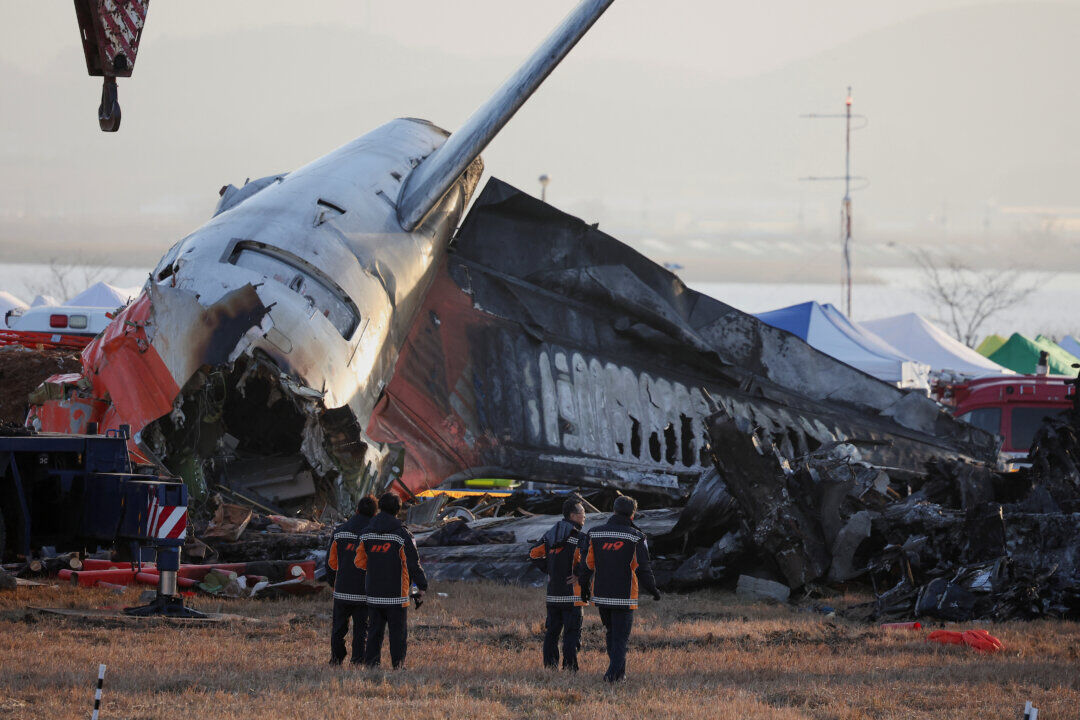SEOUL/MUAN COUNTY, SOUTH KOREA—South Korea ramped up investigations on Tuesday into the cause of its deadliest domestic air accident as police worked to identify victims while families of those killed in the crash of a Jeju Air jet pushed for more details.
All 175 passengers and four of the six crew were killed when the Boeing 737–800 belly-landed and skidded off the end of the runway at Muan International Airport on Sunday, erupting in a fireball as it slammed into an embankment holding navigation equipment.
Comments in the airport’s operating manual, uploaded early in 2024, said the embankment was too close to the end of the runway and recommended that the location of the equipment be reviewed during a planned expansion.
A transport ministry official said authorities would need to check the document before replying to questions.
Impatience rose on Tuesday among families gathered at the airport as they waited for the bodies of their loved ones to be released.
One bereaved relative, Park Han-shin, said the bodies being held in freezers were prepared for transfer to funeral homes but the process could take time, and urged others to stay patient.
The National Police Agency said it was making all-out efforts to speed up the identification of the five bodies still unknown, allocating more personnel and equipment such as rapid DNA analyzers.
A “black box” flight data recorder recovered from the crash site was missing a key connector and authorities were reviewing how to extract its data, but retrieval of data from the cockpit voice recorder has begun, the transport ministry told briefings.
Inspections of all 101 B737–800s operated by South Korean airlines were set to wrap up by Jan. 3, though the airport would stay closed until Jan. 7, it added in a statement.
Personnel from the U.S. National Transportation Safety Board (NTSB), Federal Aviation Administration, and aircraft maker Boeing have joined the investigations.
On Monday, South Korea’s Acting President Choi Sang-mok ordered an emergency safety inspection of the country’s entire airline operation.

Questions About Embankment
Crash investigators are considering possible factors such as bird strikes and disabled control systems on the aircraft to the pilots’ apparent rush to attempt a landing soon after declaring an emergency, fire, and transport officials have said.
Officials have also faced questions about airport design features, particularly the large dirt-and-concrete embankment near the end of the runway used for navigation equipment.
The plane slammed into the embankment at high speed and erupted into a fireball. Bodies and body parts were thrown into surrounding fields and most of the aircraft disintegrated in flames.
Transport Ministry officials said most South Korean airports were built based on International Civil Aviation Organization rules that recommend a 262-yard runway-end safety area.
However, a domestic law allows adjusting the location of some installations in a range that does not “significantly affect” the facility’s performance.
“But we’ll look into whether there are any conflicts in our own regulations, and conduct an additional review of our airport safety standards,” Kim Hong-rak, director general for airport and air navigation facilities policy, told a briefing.
Muan International Airport’s Airport Operations Manual said the navigation equipment, called localizers, was installed too near the end of the runway, or just 218 yards from the crash site.
The document, prepared by Korea Airports Corp. and uploaded on its website, said the airport authority should “review securing additional distance during phase two of Muan International Airport’s expansion.”
South Korean officials have previously said the structure was about 273 yards from the end of the runway itself, though a paved apron extends past that.
The runway design did not meet industry best practices, however, said John Cox, chief executive of Safety Operating Systems and a former 737 pilot, adding that they preclude any hard structure like a berm within at least 330 yards of the end of the runway.
Video showed the plane appearing to slow down and in control when it went off the runway, Cox said. “When it hits that berm is when it turns into tragedy.”
Muted Celebrations
Both floors of Muan Airport’s main building were still packed with bereaved relatives on Tuesday evening as many waited for the opening of an altar to pay their respects to the deceased. Others rested in hundreds of tents erected in the airport. Religious, social welfare, and volunteer groups were busy supplying food and drink.

Relatives took turns to bow in front of the makeshift altar, lined with chrysanthemums and pictures of the deceased, with some sobbing loudly after paying their respects.
With the nation grieving over the flight disaster, New Year’s Eve celebrations across the country were canceled.
Broadcasters KBS, MBS, and SBS canceled their annual award ceremonies or countdown festivals. The Seoul Metropolitan Government announced its annual bell-ringing show scheduled for Tuesday would be a quiet one without performances but with a moment of silence.

